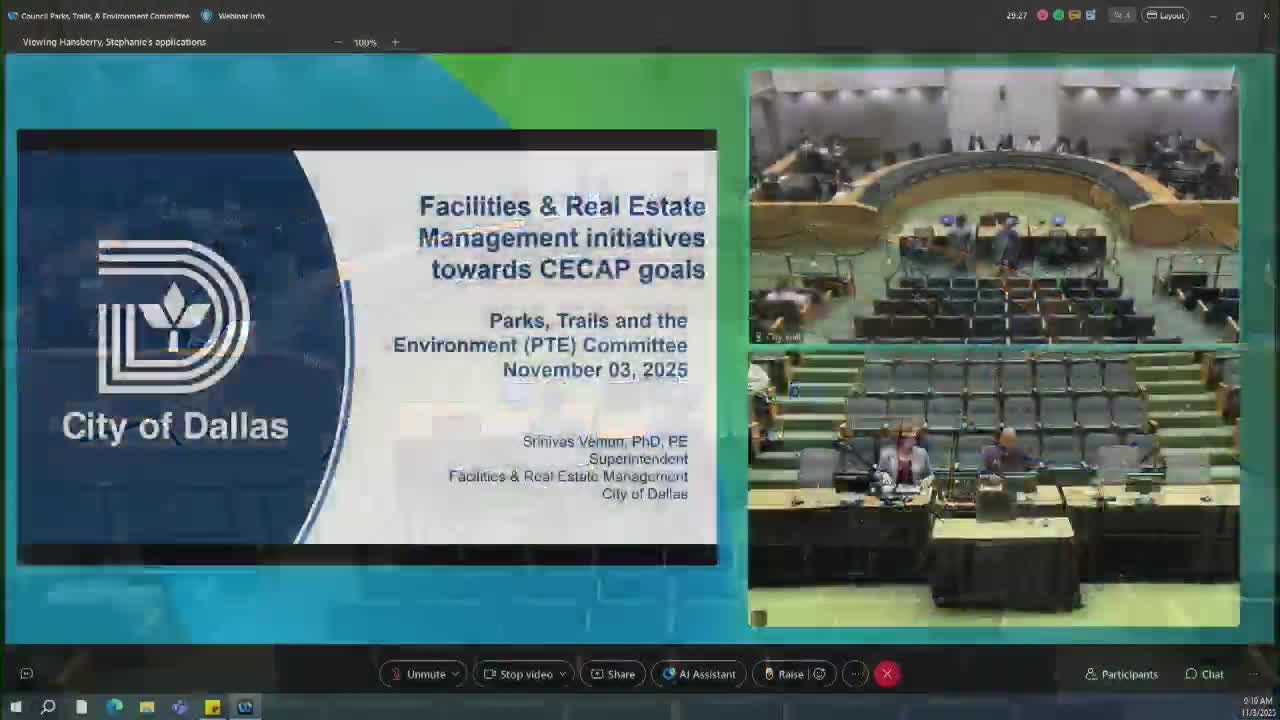Dallas outlines energy-efficiency, lighting and solar plans for city buildings under CCAP
Get AI-powered insights, summaries, and transcripts
Subscribe
Summary
Facilities and Real Estate Management reported progress toward the city’s Comprehensive Climate and Action Plan, citing energy benchmarking of 195 buildings, 45 SECO energy audits, completed heating and lighting retrofits, and planned solar pilot projects pending council approval and grant awards.
Srinivas Memuri, superintendent with Facilities and Real Estate Management, briefed the Parks, Trails and Environment Committee on Nov. 3 about the department’s work toward the Comprehensive Climate and Action Plan (CCAP), including energy benchmarking, completed retrofits and planned solar projects.
The presentation outlined that the city completed energy benchmarking for 195 occupied city buildings using ENERGY STAR Portfolio Manager and partnered with the State Energy Conservation Office (SECO) to complete preliminary energy audits for 45 buildings (17 recreation centers, 12 libraries, 9 fire stations and 7 administrative buildings). Staff said lighting improvements were recommended for 37 buildings and solar opportunities were identified for 37 buildings in the audits.
Memuri described recently completed projects: conversion of City Hall’s heating system from steam to a high-efficiency hot-water system (completed December 2024, total project cost about $3,200,000 with an estimated 20% annual gas savings) and an April 2023 lighting retrofit at three facilities (combined cost about $990,000 and estimated lighting energy savings of about 35%). He said the city received approximately $1,130,000 under the U.S. Department of Energy’s Energy Efficiency and Conservation Block Grant program to install high-efficiency lighting and lighting controls in five city buildings (named in the briefing).
On renewable energy, Memuri said the city’s utility contract signed in 2019 sources wind-generated energy for operations and that Dallas ranks second nationally among local governments for annual green-power use under the U.S. Environmental Protection Agency’s Green Power Partnership. FRM has completed three solar installs (combined capacity described as 422 kilowatts) and reported 11 city buildings now have solar PV installed with a combined total listed in the briefing (staff presented the figure as ~910 kilowatt hours of installed capacity; staff clarified the deployed metric as capacity in kilowatts across sites).
Planned projects include a solar-plus-battery pilot at Bachman Recreation Center (project estimate presented as $1,600,000, about $975,000 for solar plus roughly $700,000 for electrical switchgear upgrades, with an estimated completion in December 2025) and a solar PV project at Beckley Center Recreation Center (estimated $500,000, completion in mid-2026). Memuri said staff established criteria for rooftop solar projects—public-facing buildings (libraries, rec centers), recent roof replacement (within five years), minimal shading and an expected solar offset of at least 20%—and that of 44 rec centers and 29 libraries, a small number are installed or planned today.
Committee members pressed on maintenance, operability and funding. Vice Chair West and Council Member Blair asked whether installations were being maintained and whether some were inoperable. Memuri said most systems are operable but not all are performing at 100%; the city has a vendor contract for repairs and is working with manufacturers under warranty to replace failed inverters. On maintenance frequency Memuri said routine upkeep typically includes an annual panel cleaning plus checks of inverters and wiring.
On grant funding, Memuri said staff are pursuing a separate DOE award for work at the MLK Complex: a proposed $2,000,000 DOE award with a $2,000,000 city match. He said federal Buy American or domestic-manufacturing requirements for solar components complicate vendor selection and that an RFI is open to collect construction estimates needed for the federal application. Memuri said he believed matching funds were allocated in a prior fiscal year but said he would confirm whether the match is currently set aside.
Memuri said staff will continue to pursue energy-efficiency projects as funding and grants become available and will coordinate with other departments on grant applications. He closed by saying FRM will focus both on new installations and on ensuring existing systems are maintained.
